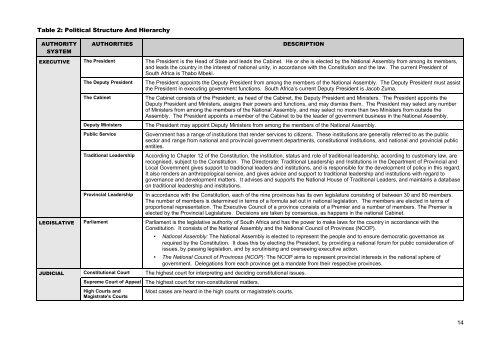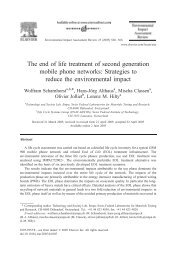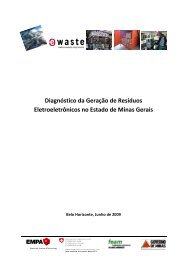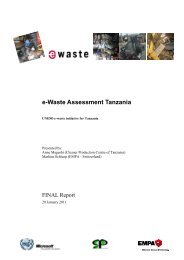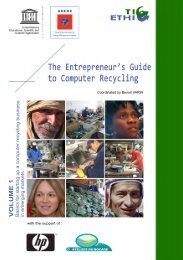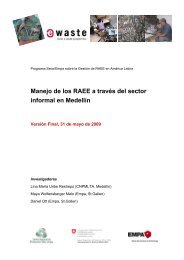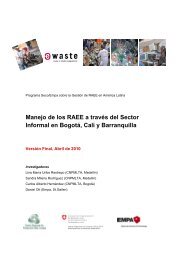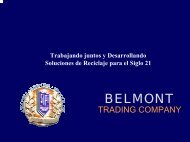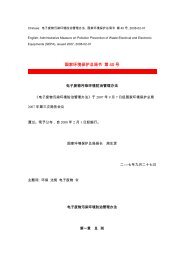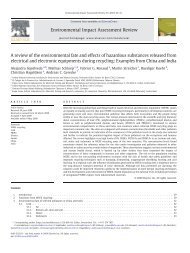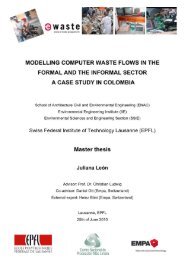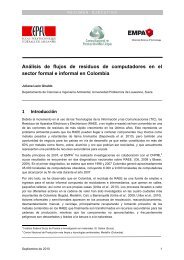E-WASTE ASSESSMENT IN SOUTH AFRICA - e-Waste. This guide
E-WASTE ASSESSMENT IN SOUTH AFRICA - e-Waste. This guide
E-WASTE ASSESSMENT IN SOUTH AFRICA - e-Waste. This guide
You also want an ePaper? Increase the reach of your titles
YUMPU automatically turns print PDFs into web optimized ePapers that Google loves.
Table 2: Political Structure And HierarchyAUTHORITYSYSTEMAUTHORITIESDESCRIPTIONEXECUTIVE The President The President is the Head of State and leads the Cabinet. He or she is elected by the National Assembly from among its members,and leads the country in the interest of national unity, in accordance with the Constitution and the law. The current President ofSouth Africa is Thabo Mbeki.The Deputy PresidentThe CabinetDeputy MinistersPublic ServiceTraditional LeadershipProvincial LeadershipThe President appoints the Deputy President from among the members of the National Assembly. The Deputy President must assistthe President in executing government functions. South Africa’s current Deputy President is Jacob Zuma.The Cabinet consists of the President, as head of the Cabinet, the Deputy President and Ministers. The President appoints theDeputy President and Ministers, assigns their powers and functions, and may dismiss them. The President may select any numberof Ministers from among the members of the National Assembly, and may select no more than two Ministers from outside theAssembly. The President appoints a member of the Cabinet to be the leader of government business in the National Assembly.The President may appoint Deputy Ministers from among the members of the National Assembly.Government has a range of institutions that render services to citizens. These institutions are generally referred to as the publicsector and range from national and provincial government departments, constitutional institutions, and national and provincial publicentities.According to Chapter 12 of the Constitution, the institution, status and role of traditional leadership, according to customary law, arerecognised, subject to the Constitution. The Directorate: Traditional Leadership and Institutions in the Department of Provincial andLocal Government gives support to traditional leaders and institutions, and is responsible for the development of policy in this regard.It also renders an anthropological service, and gives advice and support to traditional leadership and institutions with regard togovernance and development matters. It advises and supports the National House of Traditional Leaders, and maintains a databaseon traditional leadership and institutions.In accordance with the Constitution, each of the nine provinces has its own legislature consisting of between 30 and 80 members.The number of members is determined in terms of a formula set out in national legislation. The members are elected in terms ofproportional representation. The Executive Council of a province consists of a Premier and a number of members. The Premier iselected by the Provincial Legislature. Decisions are taken by consensus, as happens in the national Cabinet.LEGISLATIVE Parliament Parliament is the legislative authority of South Africa and has the power to make laws for the country in accordance with theConstitution. It consists of the National Assembly and the National Council of Provinces (NCOP).• National Assembly: The National Assembly is elected to represent the people and to ensure democratic governance asrequired by the Constitution. It does this by electing the President, by providing a national forum for public consideration ofissues, by passing legislation, and by scrutinising and overseeing executive action.• The National Council of Provinces (NCOP): The NCOP aims to represent provincial interests in the national sphere ofgovernment. Delegations from each province get a mandate from their respective provinces.JUDICIAL Constitutional Court The highest court for interpreting and deciding constitutional issues.Supreme Court of AppealHigh Courts andMagistrate's CourtsThe highest court for non-constitutional matters.Most cases are heard in the high courts or magistrate's courts.14


